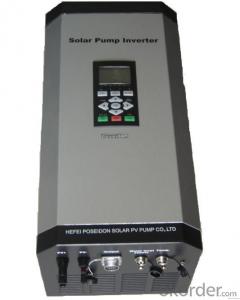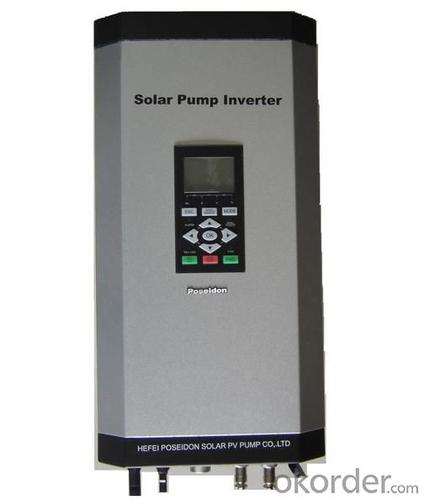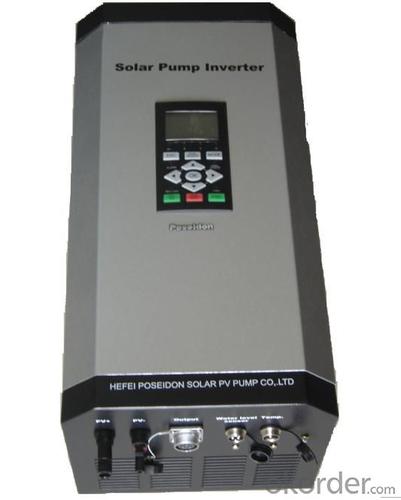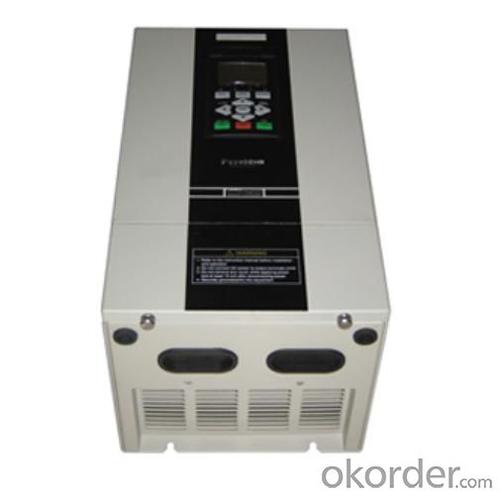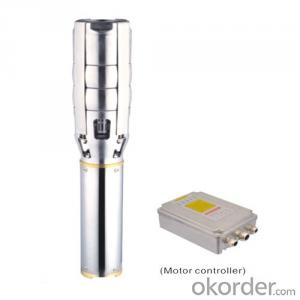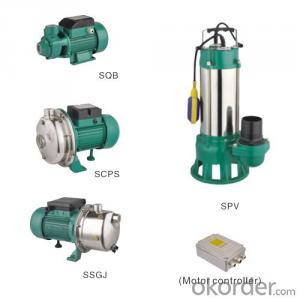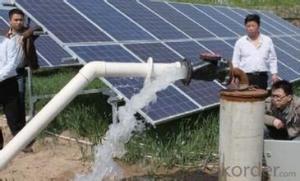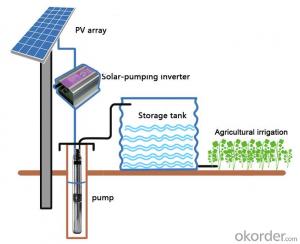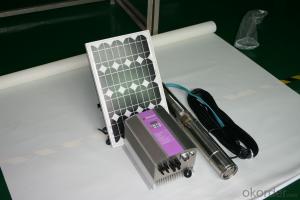Pond Solar Pump FCPM3KWH Inverter
- Loading Port:
- China Main Port
- Payment Terms:
- TT OR LC
- Min Order Qty:
- -
- Supply Capability:
- -
OKorder Service Pledge
Quality Product, Order Online Tracking, Timely Delivery
OKorder Financial Service
Credit Rating, Credit Services, Credit Purchasing
You Might Also Like
Solar pump inverter FCPM3KWH Product Description:
Product Description:
Solar water pumping system is constructed with solar panel array,solar pump inverter and AC water pump, DC current produced from solar panel will be delivered to solar pump inverter,and it will convert it into AC current to drive water pump,and will automatically regulate output frequency according to sun radiance intensity,maximally realize MPPT tracking function.
Product Features
Adopting the proposed dynamic VI maximum power point tracking (MPPT) control method, with fast response, and reliable operation, achieves efficiency of 99%.
Designed with variable frequency driver, greatly improves efficiency
Extremely high efficiency
Digital mode control, with automatic operation and manual operation mode options
Complete protection functions
Adopts intelligent IPM module, with high reliability
LCD display and operation panel, in real time presents operating data
Optional for water level measurement and control circuit
Applicable for general ACC pumps, like centrifugal pump, piston pump etc.
Independent intellectual property; Highly effective, the redundant reliability, exempts the maintenance and the long life.
The pumps are soft started, fully protected.
No batteries are used. So better Sunlight, more water
Datasheet.
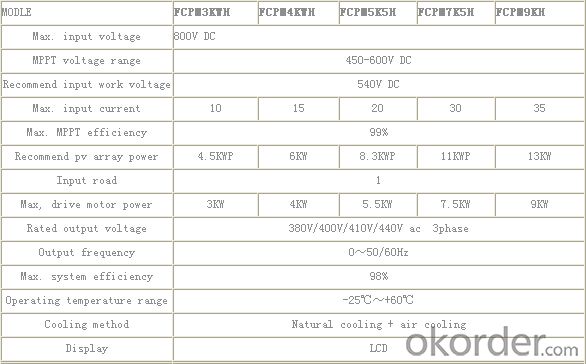
- Q: Can a solar pump be used for emergency water supply?
- Yes, a solar pump can be used for emergency water supply. Solar pumps use solar energy to power the pumping mechanism, which means they do not rely on electricity or fuel, making them ideal for emergency situations where power may be limited or unavailable. They can be used to extract water from wells, rivers, or any other water source, providing a reliable and sustainable solution for emergency water supply needs.
- Q: How does the efficiency of a solar pump system vary with different water viscosities?
- The efficiency of a solar pump system may vary with different water viscosities. Viscosity refers to the thickness or resistance to flow of a liquid, such as water. In general, higher water viscosities can lead to decreased efficiency of a solar pump system. This is because higher viscosity results in increased frictional losses and resistance within the pump system. As the water becomes thicker, it requires more energy to move and overcome the resistance, which can lead to a reduction in the overall efficiency of the system. Moreover, higher viscosity may also impact the performance of the pump itself. The pump's design and specifications are usually optimized for a specific range of water viscosities. If the viscosity deviates significantly from the ideal range, the pump may not be able to operate efficiently, resulting in reduced performance and lower overall efficiency. It is important to note that the impact of water viscosity on solar pump system efficiency may vary depending on the specific design and components of the system. Some systems may be more tolerant to changes in viscosity, while others may be more sensitive. Therefore, it is advisable to consult the manufacturer or system specifications to determine the recommended viscosity range for optimal performance and efficiency.
- Q: Solar water heater before the booster pump is now changed into tap water how to get
- If your water pressure is sufficient, you can directly on the water pipe connected to the water pipe on the line.
- Q: Can a solar pump be used for water supply in dairy farms?
- Yes, a solar pump can be used for water supply in dairy farms. Solar pumps are a sustainable and cost-effective solution for providing water to dairy farms, as they rely on renewable energy from the sun. They can efficiently pump water from various sources such as wells, boreholes, or rivers, ensuring a reliable and continuous water supply for the dairy farm's needs. Additionally, solar pumps require minimal maintenance and have a long lifespan, making them a practical choice for water supply in dairy farms.
- Q: Can a solar pump be used in areas with limited access to water usage?
- Yes, a solar pump can be used in areas with limited access to water usage. Solar pumps are particularly well-suited for remote and off-grid locations where traditional electricity supply is unreliable or unavailable. They can efficiently pump water from underground sources such as wells, boreholes, or rivers, providing a reliable water supply for various purposes, such as irrigation, livestock watering, or domestic use. The use of solar energy eliminates the need for expensive fuel or electricity, making it a cost-effective and sustainable solution for water pumping in areas with limited access to water usage.
- Q: How long does it take to recoup the investment in a solar pump system?
- The time it takes to recoup the investment in a solar pump system depends on various factors such as the initial cost of the system, the amount of energy savings achieved, and any applicable government incentives or subsidies. On average, it can take between 5 to 10 years to recover the investment in a solar pump system through reduced electricity bills and potential revenue from selling excess energy back to the grid. However, this timeframe can vary significantly depending on individual circumstances and regional factors.
- Q: Are there any government incentives for using solar pumps?
- Government incentives are available for the utilization of solar pumps. Many governments worldwide acknowledge the significance of renewable energy, particularly solar power, and thereby offer diverse incentives to stimulate its adoption. These incentives comprise financial rewards, tax credits, grants, and subsidies that offset the initial expenses associated with the installation and usage of solar pumps. In the United States, for instance, the federal government provides a 26% Investment Tax Credit (ITC) for solar energy systems, including solar pumps. This enables individuals and businesses to deduct 26% of the installation costs from their federal taxes. Moreover, certain states offer supplementary incentives such as rebates or performance-based rewards to further encourage the utilization of solar pumps. Similar incentives are also available in other countries. Germany, Australia, and India, for instance, implement feed-in tariffs which guarantee a fixed payment for the electricity generated by solar pumps. This financial incentive motivates individuals and businesses to invest in solar pumps and sell any surplus energy back to the grid. Additionally, specific incentives may be provided by particular regions or local governments to promote the adoption of solar pumps. These incentives can include grants or subsidies specifically tailored for farmers or rural communities, facilitating their transition from conventional diesel or electric pumps to solar-powered alternatives. These government incentives serve to not only alleviate the upfront costs associated with solar pump installation but also to foster sustainable and clean energy solutions. By promoting the adoption of solar pumps, governments aspire to reduce reliance on traditional energy sources, diminish greenhouse gas emissions, and contribute to the overall transition towards a more sustainable future.
- Q: Can a solar pump be used for water supply in remote mountain regions?
- Yes, a solar pump can be used for water supply in remote mountain regions. Solar pumps use energy from the sun to power the pump, eliminating the need for electricity or fuel. This makes it a suitable and sustainable solution for areas without access to a power grid. Additionally, solar pumps can be easily installed and maintained, making them a practical choice for remote locations.
- Q: How does the programming and control system of a solar pump work?
- The programming and control system of a solar pump works by utilizing various components and technologies to ensure efficient and reliable operation. Firstly, the system consists of solar panels that convert sunlight into electrical energy. These panels are usually installed in a location with maximum exposure to sunlight to ensure optimal energy generation. The solar panels are connected to a charge controller, which regulates the voltage and current from the panels to prevent overcharging of the batteries. The control system also includes batteries, which store the generated electrical energy for later use when sunlight is not available, such as during the night or on cloudy days. The batteries are connected to an inverter, which converts the stored DC (direct current) power into AC (alternating current) power, suitable for driving the pump motor. The programming aspect of the system involves setting up timers and sensors to control the pump's operation. For instance, a timer can be programmed to activate the pump during specific times of the day when sunlight is abundant. This ensures that the pump operates when there is sufficient solar energy available. In addition, sensors can be integrated into the system to monitor water levels, pressure, or other relevant parameters. These sensors can provide feedback to the control system, allowing it to adjust the pump's speed or halt operation if certain thresholds are exceeded. This helps in preventing over-pumping or damage to the system. Furthermore, the programming and control system may also incorporate features such as remote monitoring and control. This allows users to monitor the pump's performance, receive alerts on any issues, and adjust settings remotely using a smartphone or computer. Such features enhance convenience and enable proactive maintenance. Overall, the programming and control system of a solar pump combines the power generation capabilities of solar panels, the energy storage capacity of batteries, and intelligent programming to optimize the pump's operation. This results in an efficient, sustainable, and reliable water pumping solution that harnesses the power of the sun.
- Q: Can solar pumps be used for water supply in military or defense applications?
- Yes, solar pumps can be used for water supply in military or defense applications. Solar pumps are reliable, cost-effective, and environmentally friendly alternatives to traditional fuel-powered pumps. They can provide a sustainable source of water in remote or off-grid locations, which is essential for military operations. Additionally, the use of solar pumps reduces the logistical burden of transporting and storing fuel, making them ideal for defense applications.
Send your message to us
Pond Solar Pump FCPM3KWH Inverter
- Loading Port:
- China Main Port
- Payment Terms:
- TT OR LC
- Min Order Qty:
- -
- Supply Capability:
- -
OKorder Service Pledge
Quality Product, Order Online Tracking, Timely Delivery
OKorder Financial Service
Credit Rating, Credit Services, Credit Purchasing
Similar products
Hot products
Hot Searches
Related keywords

